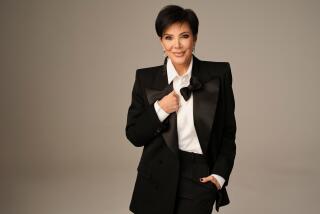Op-Ed: Of course Kylie Jenner didn’t build that
When Forbes put Kylie Jenner on the cover of its latest issue and declared her one of the “60 richest self-made women,” the magazine seemed to think it was telling a simple, inspiring tale: About how the youngest child of America’s reality-TV royal family, the Kardashians, became an almost-billionaire cosmetics mogul before the age of 21. But the meaning of the story lay in the politics of the beholder.
There are two basic ways to read the cover. The first is that there are more bootstrapping entrepreneurs in America than ever before, many of whom are creating new technology or, like Jenner, harnessing it to make their millions.
The second is that America is not the level playing field that places such as Forbes pretend it is, and Jenner illustrates perfectly that, while your odds of going from rich to filthy rich are still pretty good, your odds of going from rags to riches have never been slimmer.
Immediately, the cover generated a debate about the “self-made” label, which shows that America’s class consciousness is shifting.
Forbes has been publishing its rankings of the nation’s richest people since 1982. There was little outcry when, in 2014, the publication initiated a “self-made score” for the millionaires and billionaires on its list. A score of 1 through 5 means someone “inherited some or all of their fortune,” while a score of 6 through 10 is applied to “those who truly made it on their own.” Oprah Winfrey, born to a teen mom in Mississippi, is an “absolute bootstrapper” with a score of 10.
In America today it’s easy to get from third to home, but it’s become almost impossible to get off first base.
Jenner scored a 7, indicating that although she was born rich, she made it to near-billionaire status “on her own.” Forbes noted that Jenner is on the cusp of becoming the youngest “self-made” billionaire ever, eclipsing Mark Zuckerberg — who became a billionaire at age 23 and boasts a self-made score of 8.
Those scores are delusional. Zuckerberg, the son of a dentist and a psychiatrist raised in Westchester county, a prosperous New York suburb, was educated at the elite boarding school Phillips Exeter. Jenner, raised in Calabasas, was only 10 years old in 2007, when “Keeping Up with the Kardashians” debuted. The family renewed its reality-show contract with E! In 2015 for a reported $100 million and again in 2017 for a reported $150 million. Although Jenner’s cut has not been made public, her social media following and subsequent cosmetics business clearly were built on the wealth and fame that she was born into.
The backlash to the Forbes article crested when comedian the Fat Jew created a page on GoFundMe — a fundraising platform more typically used to cover medical expenses for the broke and uninsured — and sarcastically asked people to donate to help Jenner cross the youngest-billionaire threshold. Jenner “liked” the post on Instagram, and hundreds of her fans took it seriously. So far the page has raised more than $2,000.
Jenner’s half-sister, Kim Kardashian West, replied to critics: “What, because we came from a family that has had success? To me, that doesn’t really make sense. ... I know so many people like that [who] haven’t turned out to be as successful as Kylie.” Heiress Paris Hilton joined the chorus, calling Jenner “a girl boss.” And in a separate cover story this week, GQ defended Jenner, too, noting that “it’s important to remember that Kylie’s cosmetics business was built by grinding.”
To put this perspective in terms of a well-worn metaphor about class: Sure, Jenner was born on third, but why not talk about how quickly she crossed home plate?
The truth is, in America today it’s easy to get from third to home, but it’s become almost impossible to get off first base. Wages are rising fastest for people who already make a decent living, according to the Economic Policy Institute, while the traditional means of closing the gap — like a college education — are less of a guarantee than ever.
Enter the Fray: First takes on the news of the minute from L.A. Times Opinion »
Yet according to Pew, only 1 in 5 people think that the American dream is out of reach for their family. America’s founding myth is that anyone can find success by working hard. Even as inequality grows — particularly along race and gender lines — we want to believe that “self-made” millionaire status is as achievable for the African American daughters of unmarried teens in Mississippi as it is for Westchester-raised Exeter students and reality television stars.
It’s easier to praise the likes of Zuckerberg and Jenner than it is to focus on creating opportunities for people who start out like Winfrey.
“Everyone is right that Kylie Jenner is not a ‘self-made billionaire’; now extrapolate that point to apply to all billionaires,” tweeted writer Natalie Shure. As President Obama once said of wealthy Americans, you didn’t build that. Or at least most of you didn’t. Media coverage of the most successful ought to reflect that.
Ann Friedman is a contributing writer to Opinion.
Follow the Opinion section on Twitter @latimesopinion or Facebook.
More to Read
A cure for the common opinion
Get thought-provoking perspectives with our weekly newsletter.
You may occasionally receive promotional content from the Los Angeles Times.










